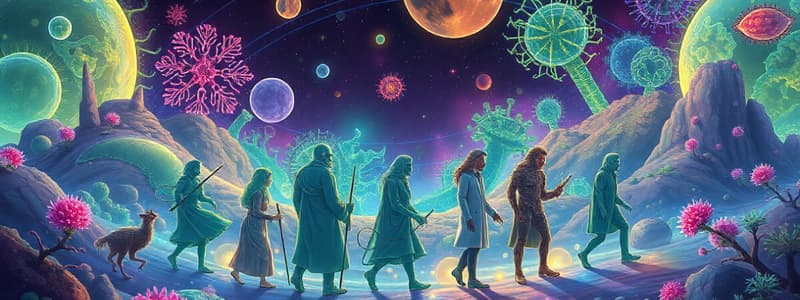Podcast
Questions and Answers
What significant biological structure did Robert Hooke discover in 1665, and what was the method used for this discovery?
What significant biological structure did Robert Hooke discover in 1665, and what was the method used for this discovery?
Robert Hooke discovered the 'cell' using a microscope.
How did Gregor Mendel's experiments with peas contribute to our understanding of genetics?
How did Gregor Mendel's experiments with peas contribute to our understanding of genetics?
Mendel's experiments revealed the principles of dominant and recessive traits, forming the foundation of Mendelian inheritance.
What theory did Louis Pasteur prove that transformed the understanding of infectious diseases?
What theory did Louis Pasteur prove that transformed the understanding of infectious diseases?
Louis Pasteur proved the germ theory of disease.
In what way did Watson and Crick's identification of DNA's structure support concepts proposed by Mendel and Darwin?
In what way did Watson and Crick's identification of DNA's structure support concepts proposed by Mendel and Darwin?
What is the significance of Brownian motion in the study of cellular biology, as introduced by Robert Brown?
What is the significance of Brownian motion in the study of cellular biology, as introduced by Robert Brown?
Who is known as the father of microbiology and what was his key contribution?
Who is known as the father of microbiology and what was his key contribution?
What significant law did Robert Hooke formulate, and what was his discovery that contributed to cell biology?
What significant law did Robert Hooke formulate, and what was his discovery that contributed to cell biology?
What is Brownian motion, and who introduced this concept?
What is Brownian motion, and who introduced this concept?
What did Charles Darwin propose regarding species of life, and what was the major scientific discourse his theory initiated?
What did Charles Darwin propose regarding species of life, and what was the major scientific discourse his theory initiated?
Describe the significance of Gregor Mendel's work and introduce the term associated with his findings.
Describe the significance of Gregor Mendel's work and introduce the term associated with his findings.
What major theory did Louis Pasteur prove, and what notable process did he invent?
What major theory did Louis Pasteur prove, and what notable process did he invent?
What landmark discovery did James D. Watson and Francis Crick make regarding DNA?
What landmark discovery did James D. Watson and Francis Crick make regarding DNA?
How did the contributions of Watson and Crick advance the understanding of Mendel's genes?
How did the contributions of Watson and Crick advance the understanding of Mendel's genes?
What is the significance of the Greek origins of the word 'biology'?
What is the significance of the Greek origins of the word 'biology'?
Explain the contemporary definition of life according to NASA.
Explain the contemporary definition of life according to NASA.
How did Andreas Vesalius change the approach to studying human anatomy?
How did Andreas Vesalius change the approach to studying human anatomy?
What achievement is Anton van Leeuwenhoek known for in biology?
What achievement is Anton van Leeuwenhoek known for in biology?
Describe Robert Hooke's contribution to biology.
Describe Robert Hooke's contribution to biology.
What does Brownian motion describe and who introduced this concept?
What does Brownian motion describe and who introduced this concept?
What role did the scientific method play in the evolution of biology as a discipline?
What role did the scientific method play in the evolution of biology as a discipline?
Identify two major fields within biology that were influenced by the discoveries of the early biologists mentioned.
Identify two major fields within biology that were influenced by the discoveries of the early biologists mentioned.
Flashcards
Anton van Leeuwenhoek
Anton van Leeuwenhoek
Dutch microscopist; first to observe single-celled organisms.
Robert Hooke
Robert Hooke
English scientist; discovered cells in cork using a microscope, 1665.
Robert Brown
Robert Brown
Scottish botanist who described Brownian motion. Found cell nucleus.
Charles Darwin
Charles Darwin
Signup and view all the flashcards
Gregor Mendel
Gregor Mendel
Signup and view all the flashcards
Louis Pasteur
Louis Pasteur
Signup and view all the flashcards
DNA structure
DNA structure
Signup and view all the flashcards
Cell
Cell
Signup and view all the flashcards
Biology definition
Biology definition
Signup and view all the flashcards
Life definition (NASA)
Life definition (NASA)
Signup and view all the flashcards
Andreas Vesalius
Andreas Vesalius
Signup and view all the flashcards
Anton van Leeuwenhoek
Anton van Leeuwenhoek
Signup and view all the flashcards
Robert Hooke
Robert Hooke
Signup and view all the flashcards
Robert Brown
Robert Brown
Signup and view all the flashcards
Scientific Method
Scientific Method
Signup and view all the flashcards
Biodiversity
Biodiversity
Signup and view all the flashcards
Hooke's Cell Theory
Hooke's Cell Theory
Signup and view all the flashcards
Darwin's Evolution
Darwin's Evolution
Signup and view all the flashcards
Mendelian Inheritance
Mendelian Inheritance
Signup and view all the flashcards
Pasteurization
Pasteurization
Signup and view all the flashcards
DNA Structure (Watson & Crick)
DNA Structure (Watson & Crick)
Signup and view all the flashcards
Study Notes
Important Biologists
- Anton van Leeuwenhoek (1632-1723): Born in Delft, Netherlands. His interest in lenses led him to be the first to observe single-celled organisms. He is considered a biologist and the father of microbiology.
Robert Hooke (1635-1703)
- Born in the Isle of Wight, England. Received higher education at Oxford University. Studied physics and chemistry. His work includes the application of microscopy and the discovery of "cells" in 1665 using cork.
Robert Brown (1773-1858)
- Scottish botanist. Introduced the model that describes random movements of cells, known as Brownian motion. His contribution was the description of the cell nucleus in all living things.
Charles Darwin (1809-1882)
- Attended the University of Cambridge and studied medicine at the University of Edinburgh. He was considered a naturalist. He proposed the concept that all species of life came from a single source (Theory of Evolution). His theory marked the beginning of the discussion about natural selection.
Gregor Mendel (1822-1884)
- Austrian scientist/monk. His work, "Experiments on Plant Hybridization" paved the way for biology students to study genetic traits in peas. He found that a specific trait would be dominant over other traits in the same species (Mendelian Inheritance).
Louis Pasteur (1822-1895)
- French chemist and biologist. He proved the germ theory of disease and invented the process of pasteurization. He is best known for his work on the development of vaccines for rabies, anthrax, cholera, TB and smallpox.
James D. Watson (b. 1928), and Francis Crick (1916-2004)
- Jointly received the Nobel Prize in Physiology/Medicine in 1953 for their determination of the structure of DNA (deoxyribonucleic acid), a double helix model. This model provided a physical basis for Mendel's genes. Their work had a major impact on biological genetics. Their impact enabled researchers to understand the genetic code.
Studying That Suits You
Use AI to generate personalized quizzes and flashcards to suit your learning preferences.




